|
|
JAMES BOND
|
|
|
JAMES BOND
|
|
|||||||
|
|||||||
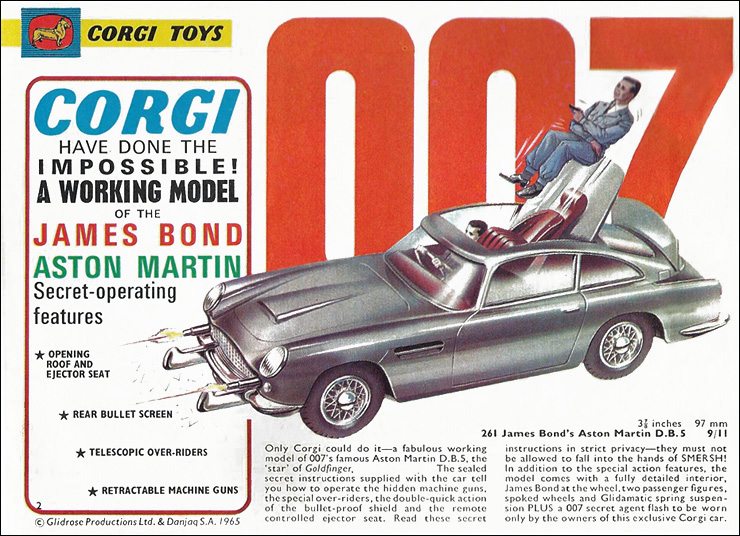 |
|||||||
|
In the summer of 1965, EON Productions (producers of the James Bond films) held a meeting in London to discuss the promotional plans for the Christmas release of Thunderball. Although most merchandising tie-ins at the time were aimed squarely at an adult audience, EON were keen to tap into the huge toy market which lent itself to the increasingly gimmick-orientated films they were then producing. Playcraft Toys Limited (a subsidiary of Mettoy) were one of the companies at the meeting and proposed a 1:46 scale model edition of the Aston Martin DB5, which would include several of the gimmicks seen on the full-sized version made famous in Goldfinger (1964). In order to get the toy into the stores in time for Christmas, CORGI's chief designer Marcel van Cleemput adapted their existing Aston Martin DB4 model, which had originally been issued in 1960 (catalogue #218) and withdrawn from circulation in 1964. The Aston Martin DB4 was the first CORGI model to have an opening bonnet, revealing a detailed engine (this feature was dropped from the DB5 versions) and had originally been issued with red paintwork (and later pale-yellow) between 1960-65. The cost of re-tooling the DB4 casing was reportedly around £45,000, a considerable sum of money in 1965. CORGI's strategy paid off, and the Aston Martin DB5 became an instant hit when it appeared in toyshops almost a year after the film which inspired it. Goldfinger had been re-released in 1965, and the car's brief appearance in Thunderball, which was on general release in early 1966 coincided with the toy being available across the country. |
|||||||
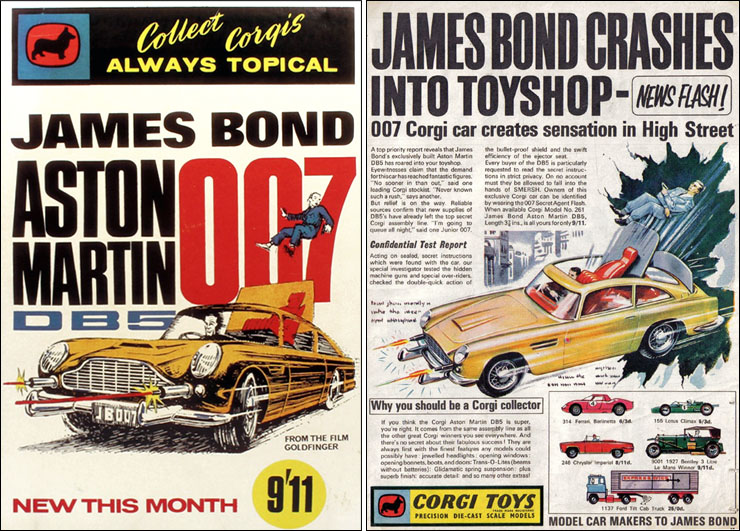 |
|||||||
|
|
|||||||
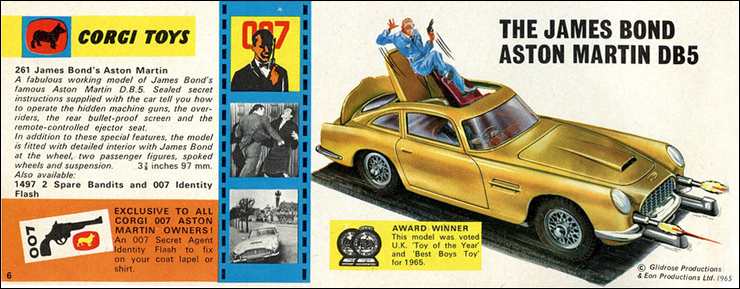 |
|||||||
|
|||||||
|
With the release of Thunderball in December 1965, ‘Bondmania’ had truly reached its zenith with children and adults alike cashing in on the cult of James Bond! Goldfinger was also re-released exclusively at the ODEON Haymarket on Thursday February 3, 1966 where it played for six weeks. A double-bill of Dr. No/From Russia With Love still playing at the Studio One cinema at Oxford Circus, and all four James Bond films could then be seen in London's West End. |
|||||||
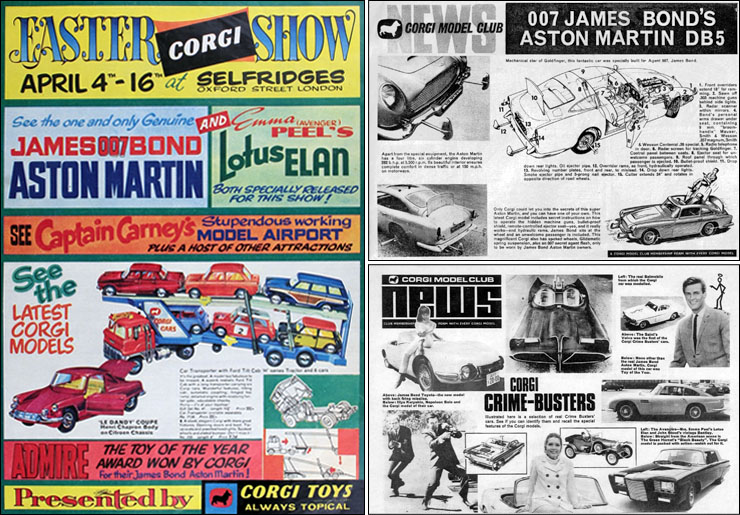 |
|||||||
|
Oxford Street department store Selfridges displayed the BSA 650 Rocket Firing Motor Bike and Underwater Towcraft seen in Thunderball at their annual ‘Easter Show for Boys & Girls’ 4th-16th April 1966, where they were joined by James Bond's Aston Martin and Emma Peel's Lotus Elan from The Avengers television series. Visitors to the ‘Easter Show’ could also view the award-winning CORGI Aston Martin DB5, which by this time had become a best-seller in toy stores across the UK - thanks to a hugely successful advertising campaign, including extensive promotion in the popular weekly children's comic TV 21, and by CORGI themselves in their own quarterly CORGI Model Club magazine. |
|||||||
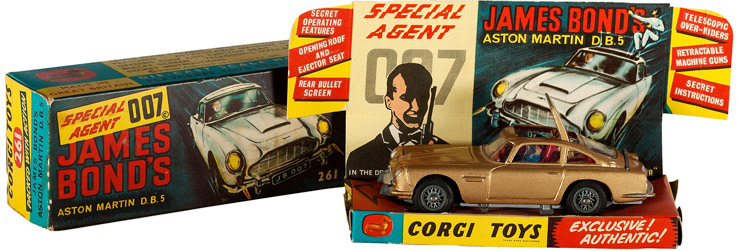 |
|||||||
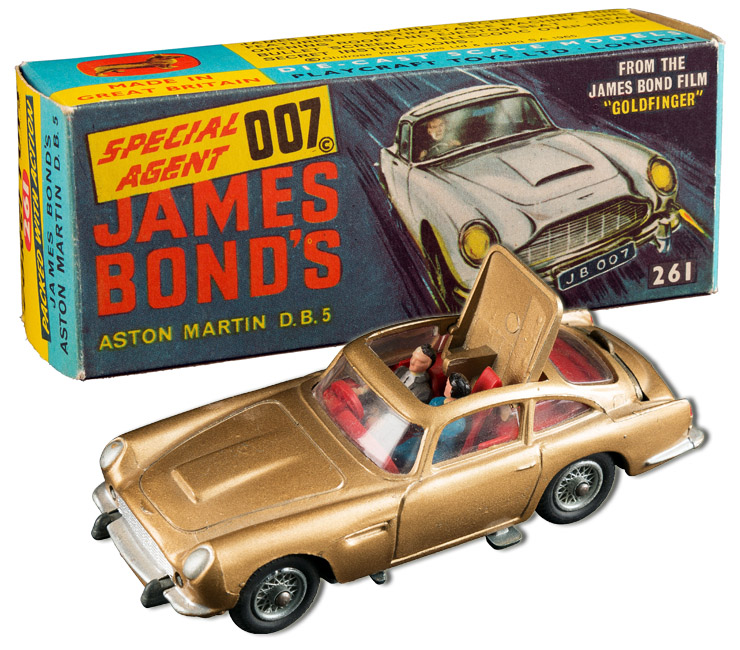 |
|||||||
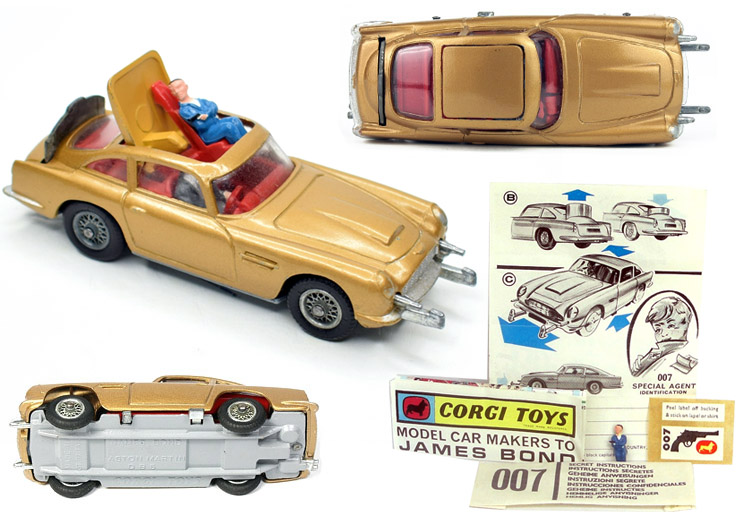 |
|||||||
|
Although the packaging stated that the car was ‘From the James Bond Film “Goldfinger”’, it was actually issued at the time Thunderball was breaking box-office records across the globe. Of course the Aston Martin DB5 featured in Thunderball as well but its gadgets were not shown off to such a degree as in Goldfinger. Curiously the original 1965 CORGI Aston Martin DB5 was issued in a gold finish instead of the Silver Birch of the film version. It was not until January 1968 (three months after the release of the CORGI Toyota 2000GT from You Only Live Twice), that CORGI re-issued the Aston Martin DB5 in the correct silver livery, and with even more special features. The decision to release the original DB5 with gold paint was taken by CORGI management as it felt that customers would think a silver version would look unfinished. Despite this, a Silver Birch edition was illustrated on the box, and used in some advertising for the toy when it was originally issued. |
|||||||
|
|||||||
|
Collector's Note: Two different versions of the original gold model Aston Martin DB5 were made. As the original 1965 release utilised a DB4 casing, this omitted the rear light clusters present on the DB5 (the DB4 just had a single indicator light), and a single petrol cap, whereas the DB5 has two. The first issue also has the left and right front indicator lights detailed in the casing and a more pronounced side air vent. Due to the enormous demand for the toy DB5, CORGI later amended the casing and issued a slightly more authentic version of the original James Bond Aston Martin DB5, which rectified most of these anomalies, although retained the gold finish. There are also slight differences to the packaging on both editions. Versions of the car with a shiny toffee-coloured finish are also in existence, although extremely rare. The second edition outer box was also amended and had a thick black line drawn around the words “JAMES BOND'S”; and shading detail around the lettering “ASTON MARTIN D.B.5” to make it stand out more. Another variation to the interior pull-out box plinth had the words “SECRET INSTRUCTIONS” printed within an arrow shape to draw attention to the fact that there was an envelope concealed inside. The gold Aston Martin also appeared in the CORGI Toys ‘All Winners’ Gift Set No. 45 in 1966, when it was packaged with four other sports and racing cars. |
|||||||
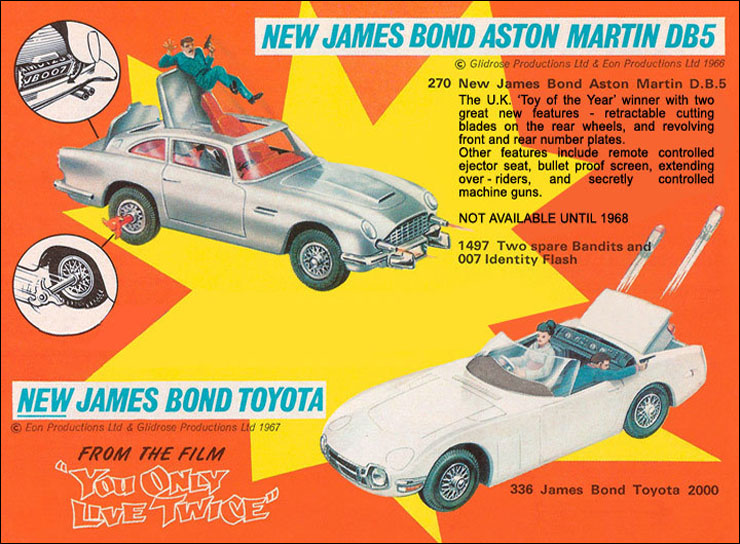 |
|||||||
|
|
|||||||
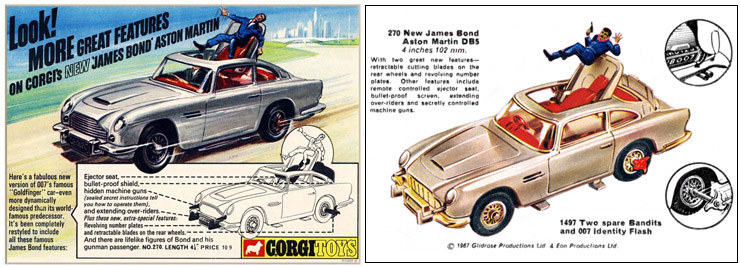 |
|||||||
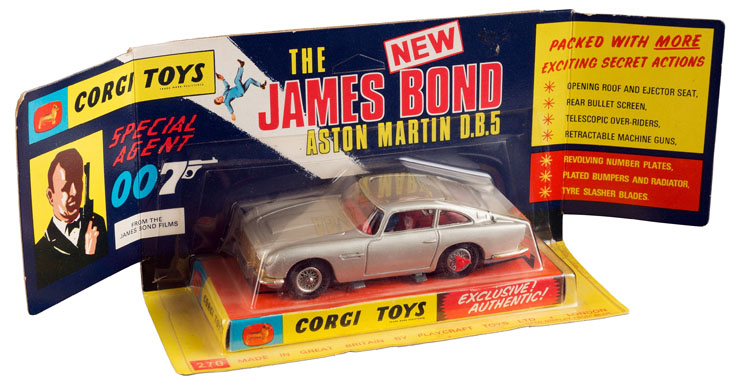 |
|||||||
|
The 1:43 scale 1968 edition (CORGI catalogue number 270) was completely re-tooled and three millimetres longer than the original version. In addition to the 1965 special features, the new edition added revolving number plates to the front and rear, and extending red plastic tyre-slashers on the rear wheels. The new edition was not as elaborately packaged as the gold version, this time being bubble-packed and with the price increased to 10/9. The packaging now stated that the car was ‘From the James Bond films’. Earlier anomalies in the 1965 edition were now all corrected. Collector's Note: There were two different versions of this model issued; the original 1968/69 issue had silver bumpers and radiator grille, whereas these were gold painted from 1969-1975. |
|||||||
 |
|||||||
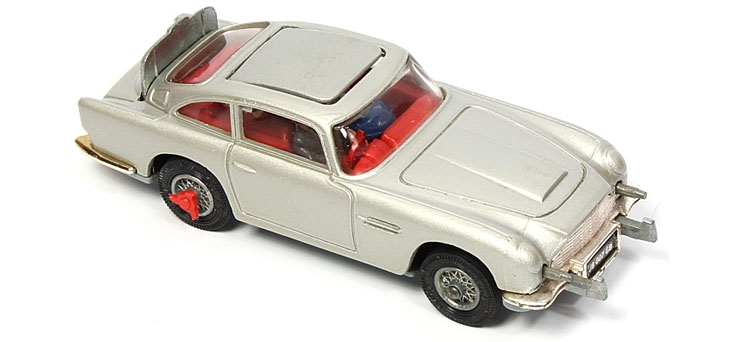 |
|||||||
|
|||||||
|
CORGI 270 was issued during 1973 in a slim blue and yellow window box instead of the original plastic bubble packaging with fold-out wing flaps, and this is by far the rarest iteration of the iconic model. The CORGI Aston Martin DB5 was then repackaged in a slightly deeper window box which cross-promoted the Batmobile [CORGI 267 (1966-1983)] and Diamonds Are Forever Moon Buggy [CORGI 811 (1972-73)] on the rear panel. |
|||||||
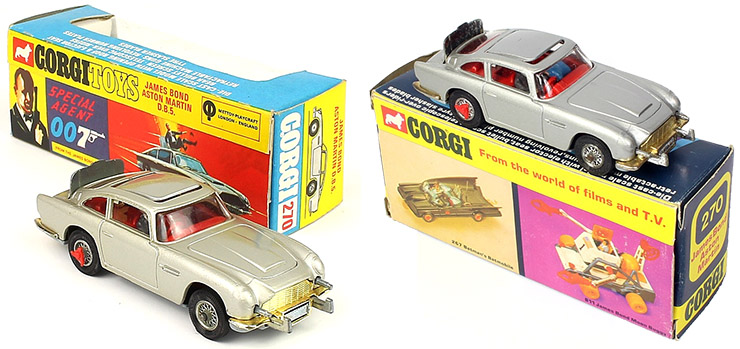 |
|||||||
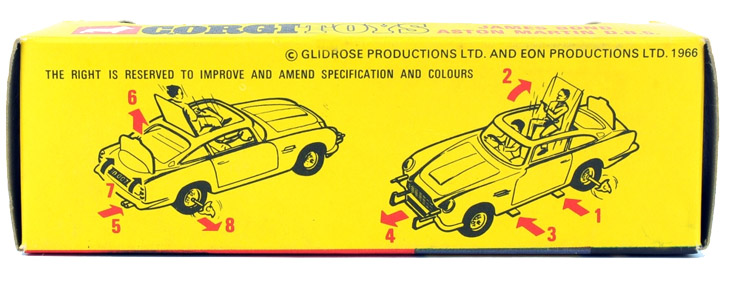 |
|||||||
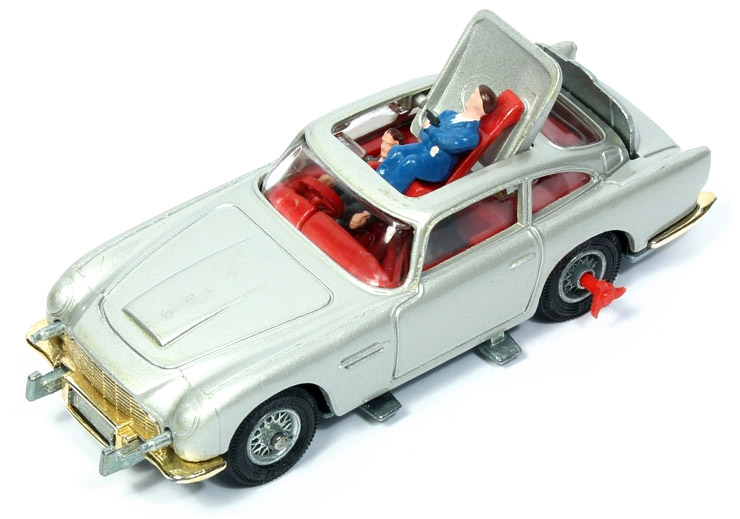 |
|||||||
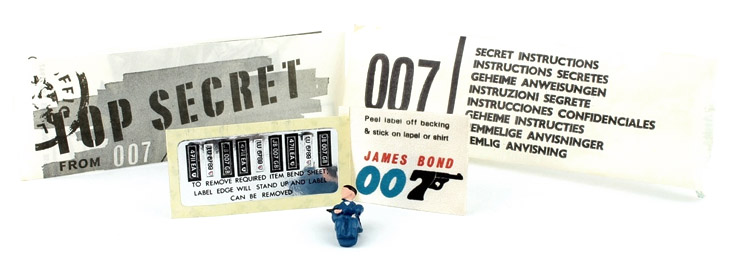 |
|||||||
|
|
|||||||
|
|||||||
|
A third slightly larger 1:36 scale version of CORGI's Aston Martin DB5 was issued in 1978 with the catalogue number 271. This version had undergone another re-tooling and does not have the revolving number plates or tyre-slashers of its predecessor. The rubber tyres featured on the two earlier editions were now plastic. This version also appeared in a 1980 Gift Set packaged with other CORGI James Bond models from The Spy Who Loved Me and Moonraker. In 1982 CORGI issued the 1:36 scale Aston Martin DB5 in a twin pack with the 1:64 scale E40 version. |
|||||||
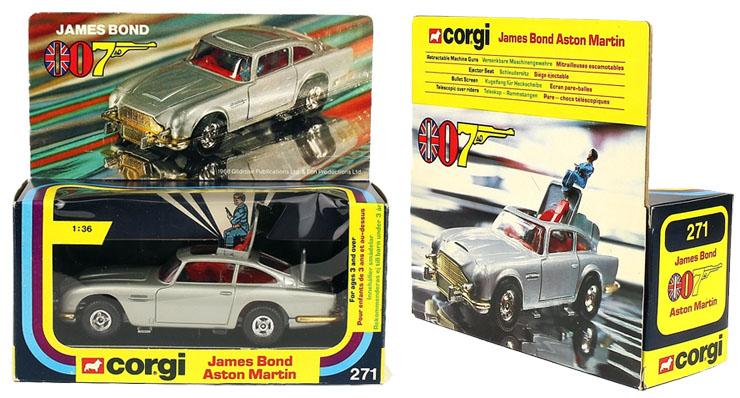 |
|||||||
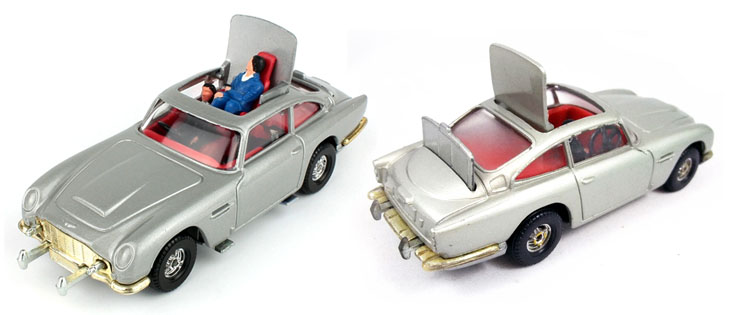 |
|||||||
|
|
|||||||